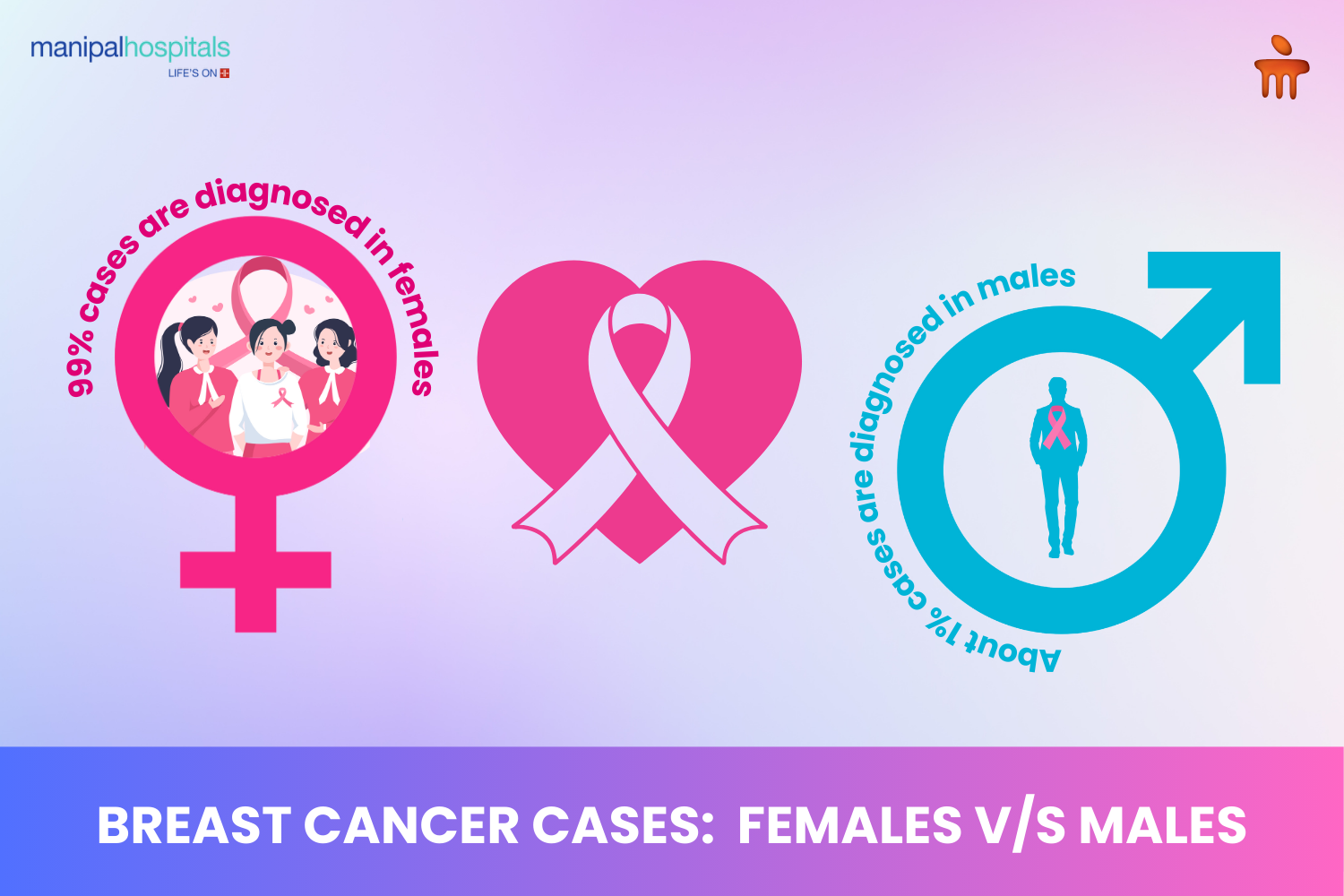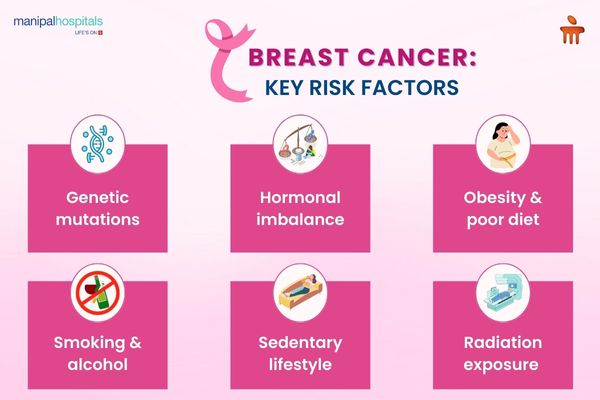
Listen to article
Loading audio...
Breast cancer is the most common type of cancer among Indian women, constituting 28.2% of all female cancer cases. Breast cancer survival rates in India lag behind those observed in more advanced nations. The late detection of breast cancer cases makes treatment outcomes less effective. The disease not only impacts the physical health of women but also has profound emotional and social implications. Better chances of survival occur when people identify breast cancer early, implement lifestyle changes, and start medical treatment as early as possible. In this blog, we will discuss what triggers breast cancer, its causes and potential risk factors, symptoms, and treatment modalities.

Synopsis
Breast Cancer: Causes & Risk Factors
Breast cancer begins in the cells of the breast when they begin to multiply and grow uncontrollably, forming a tumour. This phenomenon is often due to damage or changes to genes that normally regulate cell growth. While the exact causes behind breast cancer are not fully discovered, several factors are considered to play a role in the development of breast cancer.

Below are the primary causes of breast cancer:
-
Genetic Mutations: People with inherited BRCA1 or BRCA2 gene mutations have higher chances for breast cancer.
-
Hormonal Influence: The continued presence of oestrogen and progesterone in the body triggers abnormal cell proliferation that results in cancer development.
-
Lifestyle Factors: Cancer risk increases when people follow unhealthy eating patterns coupled with no physical activity and consume alcohol.
By understanding these breast cancer causes, people can adopt preventive measures and detect cancer early.
Risk Factors
Several specific elements make breast cancer more likely to affect people. Below are key risk factors:
-
Age: The probability of breast cancer development becomes particularly high once a woman reaches age 50.
-
Family History: When a family member or close blood relative has breast cancer, the risk of developing the disease increases.
-
Early Menarche or delayed Menopause: Women who begin menstruating at early ages or experience late menopause remain exposed to hormones for longer periods.
-
Lifestyle-Related Risk Factors: Breast cancer risk also increase due to certain lifestyle habits like unhealthy eating, becoming overweight and consuming excessive alcohol.
Types of Breast Cancer
Breast cancer varies in type, affecting treatment options and prognosis. Below are the main types:
-
Ductal Carcinoma In Situ (DCIS): A non-invasive cancer confined to the milk ducts.
-
Invasive Ductal Carcinoma (IDC): Begins in the milk ducts and spreads to nearby tissue.
-
Invasive Lobular Carcinoma (ILC): Starts in milk-producing glands and invades surrounding tissues.
Based on receptors:
-
Triple-Negative Breast Cancer: Does not have oestrogen, progesterone, or HER2 receptors and is more aggressive.
-
HER2-Positive Breast Cancer: Characterised by excessive HER2 protein, leading to rapid cell growth.
Knowing the type of cancer helps doctors decide the best treatment strategy.
Breast Cancer Symptoms and Early Detection
Early breast cancer detection is paramount in improving cancer survival rates. Below are the most common symptoms of breast cancer:
-
A lump or thickening in the breast or underarm area
-
Changes in breast size, shape, or texture
-
Nipple discharge, including blood or unusual fluid
-
Skin changes, such as redness, dimpling, or peeling
Read our blog: How To Know If You Have Breast Cancer
Self-Breast Exams and Mammograms
Alongside awareness of symptoms, regular self-breast examination and mammogram also play important roles in early breast cancer detection.
Self-breast examination helps women to become familiar with their breasts and notice any unusual changes. Oncologists recommend self-breast examination every month, ideally 1 week after your menstruation cycle.
Mammograms can detect cancer at an early stage, often before symptoms appear, which can significantly increase the chances of a cure. Mammograms are X-ray images of the breast which can detect abnormalities that may be too small to feel in self and clinical breast examinations. Women aged 40 and above should do an annual mammogram.
Treatment Options
Breast cancer treatment depends on the type and stage of cancer. After proper diagnosis and staging, your expert oncologist in Bangalore can recommend a suitable treatment option for you. Below are the primary treatment options:
-
Surgery: Removal of cancerous tissue through lumpectomy or mastectomy
-
Radiation Therapy: High-energy rays target and destroy cancer cells
-
Chemotherapy: Drugs kill or slow the growth of cancer cells
-
Hormone Therapy: Blocks hormones that fuel certain breast cancer growth
-
Targeted Therapy: Attacks specific characteristics of cancer cells
Preventive Measures and Lifestyle Changes
Breast cancer risk can be reduced through lifestyle changes. Below are effective preventive measures:
-
Maintain a Healthy Weight: Obesity increases breast cancer risk.
-
Exercise Regularly: At least 150 minutes of moderate exercise weekly helps.
-
Limit Alcohol Consumption: Alcohol increases the risk of breast cancer.
-
Breastfeed When Possible: Breastfeeding the baby can lower the risk of developing breast cancer.
-
Avoid Long-Term Hormone Therapy: Prolonged hormone replacement therapy can raise the risk.
Implementing these changes can improve overall health and reduce the risk of breast cancer.
Conclusion
Breast cancer remains a major health concern in India. Awareness, early detection, and access to treatment are key to improving survival rates. Adopting healthy habits, regular checkups, and self-examinations helps reduce risk and ensure timely treatment.
Increasing awareness and making informed decisions can save lives. Understanding the causes, symptoms, and treatment options can empower individuals to take control of their health.
If you or someone you know is at risk of breast cancer, consult with our top breast cancer specialist in Whitefield for guidance on early detection through regular screening and breast cancer management.
FAQ's
Breast cancer symptoms include a lump in the breast, changes in shape, size, or skin texture, and unusual nipple discharge. Pain and swelling in the breast or armpit may also occur.
Maintain a healthy weight, exercise regularly, eat a balanced diet, limit alcohol, and avoid smoking. Breastfeeding and regular check-ups also help lower the risk of developing breast cancer.
Some breast cancer cases are linked to inherited BRCA1 and BRCA2 gene mutations. A family history of breast cancer increases the risk, but lifestyle factors also play a significant role.
Yes, although rare, men can develop breast cancer. Symptoms include lumps, nipple discharge, and skin changes. Male breast cancer cases accounts for less than 1% of cases but require immediate medical attention.
The five-year survival rate for breast cancer in India is 66.4%. Early detection and timely treatment significantly improve survival chances. Late-stage diagnosis lowers treatment success and increases mortality rates.



















 7 Min Read
7 Min Read














